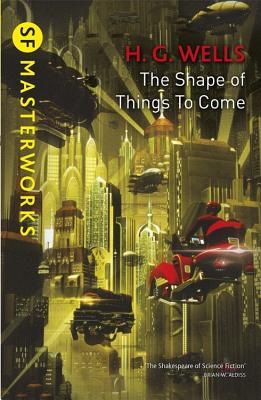Author: H.G. Wells
Publisher: Gollancz
Publication Year: 2017
Language: English
Format: Paperback
Pages: 424
When a diplomat dies in the 1930s, he leaves behind a book of 'dream visions' he has been experiencing, detailing events that will occur on Earth for the next two hundred years.
This fictional 'account of the future' (similar to LAST AND FIRST MEN by Olaf Stapledon) proved prescient in many ways, as Wells predicts events such as the Second World War, the rise of chemical warfare and climate change.
-----------------------
The Shape of Things to Come is a science fiction written by H.G. Wells which
published in 1933. The Book is framed as a ‘dream book’. In the
introduction, Wells wrote that this book is an edited version of collected
notes written by Dr Philip Raven, a diplomat. Dr Raven had dreams of a
history textbook which supposedly published in 2106. He wrote what he can
remember from these dreams into these notes. This book was then published
posthumously.
The Shape of Things to Come is split into five ‘books’, chronicling the
history of mankind starting from the Great War or World War I to the
establishment of the modern state. Each book describes specific era, the
condition of the world and how it came to be the utopia that it was.
When I was reading this book, one thing that I need to remind myself
constantly is that this book was published in 1933. I always have this
problem with Wells’s books, especially because this book is a future history
book. Although some of what happened in the book based on actual events,
it’s easy to forget that this book is a fiction, an imagined future based on
Wells’s knowledge at the time. When I think about it that way, I can’t help
but amazed at how visionary Wells was. True, as a person who lives in the
21th century I can see myself that not all of what he predicted come true.
Still, to envision such a complex future of the world in which peace is
achieved is quite a feat.
Of all the predictions and ideas in this book, one thing that I agree
wholeheartedly is the importance of education. However, in Wells’s imagined
future, religions were abolished. I believe there’s no need to sacrifice
either one. Since it’s an imagined world anyway, I won’t know for sure if we
implement Wells’s idea, the state of the world will turn out to be as how
the book describes or not.
While it’s quite a fascinating read, I have to give a small warning. The
Shape of Things to Come reads like a history textbook. It’s dense and can be
boring at times. It took me two months to finish this book. When I was in
the mood to read the book, I can get through the long and quite detailed
explanation rather quick; But when I wasn’t, reading this book was like a
homework. It’s exhausting and some of it went over my head. Having said
that, if you’re still interested in reading this book, please do. My tip is
to take your time and see the ideas presented in this book as a challenge
and provocation.
There is no sense in bringing children into the world unless there is education, training and useful work for them to do.




No comments :
Post a Comment